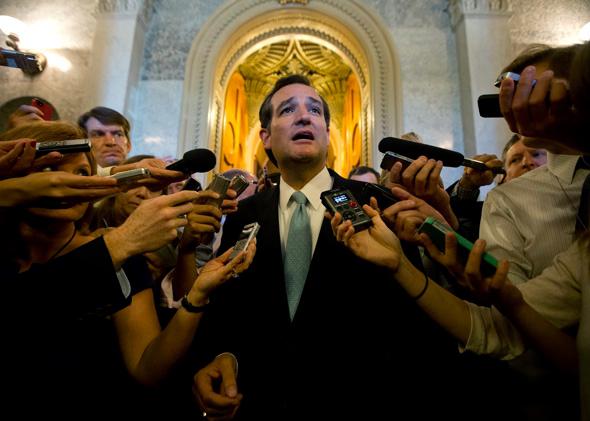At one point in the tense back and forth between Sen. Ted Cruz and Sen. Bob Corker this week, the Senate’s presiding officer, Sen. Tammy Baldwin of Wisconsin, had to remind these two Republican colleagues that “senators are to refer to each other in the third person and not by name.” This quaint rule is to keep the disagreements from getting personal. As the late Sen. Robert Byrd once put it: “It is difficult to project the image of a statesmanlike, intelligent, public servant, attempting to inform the public and examine issues, if one is behaving and speaking in a manner more appropriate to a pool room brawl than to United States Senate debate.” In keeping with that sense of civility—in which members refer to each other as “my good friend” when they mean “that craven charlatan”—I will characterize my reporting on the views of many of Cruz’s Republican colleagues in a similarly circuitous manner: Their affection for him this week became so qualified as to be indistinguishable from hatred.
They don’t keep Senate records about this kind of thing, but it’s likely that no senator has created as many enemies in his party in as short a time as the junior senator from Texas. Sen. Cruz hasn’t been content to stop there. After angering his fellow GOP senators for days, he capped the week off by making fewer friends in the House. As Robert Costa of the National Review first reported, just as House Speaker John Boehner was cobbling together support for a measure to fund the government, Cruz advised Tea Party conservatives not to support him and they took his advice.
Why do Cruz’s colleagues hate him? Based on interviews with several Republican senators and the staffs of several more, let me count the ways (in no particular order):
He weakened the GOP’s position in the coming budget debates: Right now Republicans should be unified in their opposition to President Obama’s budget policies. The president’s approval rating is at the low end of his tenure, and the country supports the GOP’s position on reducing spending. Why did Sen. Cruz drive this enormous wedge in the Republican Party on the eve of big and important fights with the White House?
He’s fooled the grassroots: By suggesting that Obamacare could actually be defunded through his Senate action, he confused voters by setting expectations that could never be met. Furthermore, he was an enabler to interest groups who sold that “bill of goods,” as Sen. Tom Coburn put it, so that they might raise more money from the grassroots.
Pressure: Members of Congress are getting lots of heat from their constituents to support Cruz in his effort. He will be able to cause headaches in the future based on the permanent false distrust he has created between members and their constituents.
Jealousy: In a matter of months, Cruz has built a base of support that allowed him to act as the de facto Republican leader of the Senate.
Breaking Reagan’s Commandment: Cruz says he has not attacked Republicans specifically, but in his alliance with Jim DeMint, the former South Carolina senator and now president of the Heritage Foundation, he has done something more powerful. He has helped raise money to run advertisements against incumbent Republican senators.
He wasted precious time: Republicans don’t want to get the blame for a government shutdown. By soaking up valuable Senate time with no-win maneuvers, Cruz has left House leaders with less time to follow their legislative strategy—one that might have won limited concessions from the White House. Or, with significantly more time, House Speaker Boehner might have been able to produce a funding bill that would have at least included a one-year delay of the Affordable Care Act. That would have put Democrats up for re-election in vulnerable states in a tough spot; at the very least, red state Democrats would have had to take an unpopular vote. Now the GOP looks fractured, time is short, and Boehner may only be able to pass the funding bill passed by the Senate Democrats—which he’ll almost certainly have to do with Democratic votes, offering even more leverage to the enemy.
Ego: He has used his colleagues to elevate himself in the furtherance of his 2016 presidential ambitions.
He made Obama’s critique look accurate: For years, President Obama has said a minority faction of zealots controls the Republican Party. By hijacking the system for a cause that had no chance of success, Cruz confirmed Obama’s cartoonish vision of a party controlled by a wing unconcerned about practical results.
He turned a tactical fight into a purity test: The majority of Republican senators agreed with Cruz on the importance of defunding Obamacare, but they disagreed with him on tactics. He characterized those with whom he had a tactical disagreement as ideological turncoats.
He blunted the GOP’s best plan of attack on Obamacare: The Affordable Care Act was falling under its own weight as stories of rickety implementation, layoffs, and companies dropping coverage of their employees continued to be published. By linking the “defunding effort” to continued funding of the government, Cruz distracted the public from Obamacare’s inherent problems. That distraction undermined Republican efforts to chip away at the legislation through smaller attacks, like a one-year delay that might have led to a full repeal if the GOP took back control of the Senate in 2014.
This is a pretty long list, and may not include everything I’ve heard this week. But there may be one more: The very fact that Sen. Cruz is despised by his Republican colleagues has only made him more popular among his fans.
